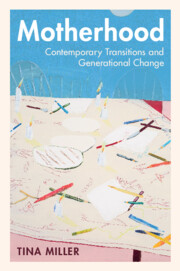Book contents
- Motherhood
- Motherhood
- Copyright page
- Dedication
- Contents
- Acknowledgements
- Introduction
- 1 Becoming a Mother
- 2 Anticipating Motherhood
- 3 Making Sense of Early Mothering Experiences
- 4 A Return to Normal
- 5 Mothering Experiences during the COVID-19 Pandemic
- 6 Conclusions and Reflections
- Appendices
- References
- Index
6 - Conclusions and Reflections
Published online by Cambridge University Press: 17 November 2023
- Motherhood
- Motherhood
- Copyright page
- Dedication
- Contents
- Acknowledgements
- Introduction
- 1 Becoming a Mother
- 2 Anticipating Motherhood
- 3 Making Sense of Early Mothering Experiences
- 4 A Return to Normal
- 5 Mothering Experiences during the COVID-19 Pandemic
- 6 Conclusions and Reflections
- Appendices
- References
- Index
Summary
The concluding chapter draws together the empirical threads identified in the preceding chapters and considers their theoretical and political implications. At one level, the aims of the book have been simple and straightforward: to examine in what ways women’s experiences of transition to first-time motherhood have changed since the original study was conducted 21 years earlier. But the unfolding accounts of transition have been anything but simple or straightforward in what they signal about women’s lives, societal expectations and contemporary motherhood. This returns us to a question posed in the opening chapter of this book, ‘has it ever been a more challenging time to be a woman who is also a mother?’ This was asked for several reasons, including a notable policy gap between discursive tropes of ‘balancing’ work and family life and everyday working and childcare conditions in the UK. But it was also posed in relation to older first-time motherhood, the effects of digitalisation on transition/motherhood experiences and how selves and gendered agency are narrated. Just over a decade ago, in her controversial article, Anne Marie Slaughter concluded that ‘women still can’t have it all’. My question is: why are we still doing it all?
Keywords
- Type
- Chapter
- Information
- MotherhoodContemporary Transitions and Generational Change, pp. 146 - 161Publisher: Cambridge University PressPrint publication year: 2023



